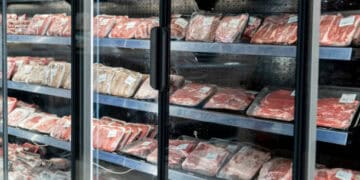The Philippines has decided to extend the lower tariff rates on imported pork for another year, a decision that benefits the U.S. pork industry. Initially set to conclude on December 31, these reduced rates will now continue until the end of 2024, supporting continued trade between the United States and the Philippines. Dan Halstrom, President and CEO of the U.S. Meat Export Federation (USMEF), stated that the lower tariffs, which were first introduced in mid-2021 to stabilize pork supplies during the Philippines’ recovery from African swine fever, were scheduled to expire at the end of the month but have been extended.
Currently, the in-quota duty rate, which is typically 30%, remains at 15%, while the out-of-quota rate has been lowered from 40% to 25%. Despite the reduction, these tariffs are considered relatively high, but the extension is seen as a positive step. USMEF expresses hope for future, more permanent tariff relief in the Philippines, highlighting the potential benefits for food security and pork consumption in the country.
According to Halstrom, making pork more available and affordable could enhance food security and increase consumption, ultimately benefiting both imported and domestic pork industries. Halstrom points to South Korea and Colombia as examples where the reduction of high duties on inbound pork has led to industry growth, increased per capita consumption, and benefits to both domestic and import sectors. The goal is to expand the market overall, which in turn benefits all stakeholders involved in the pork industry.
Stay current with supply chain report news at The Supply Chain Report. For international trade tools, see ADAMftd.com.
#PhilippinesPorkTariff #PorkImportRelief #USPhilippinesTrade #USMEF #FoodSecurity #PorkIndustryGrowth #TariffReduction #PhilippinesFoodSupply #AgricultureTrade #PorkMarketExpansion















